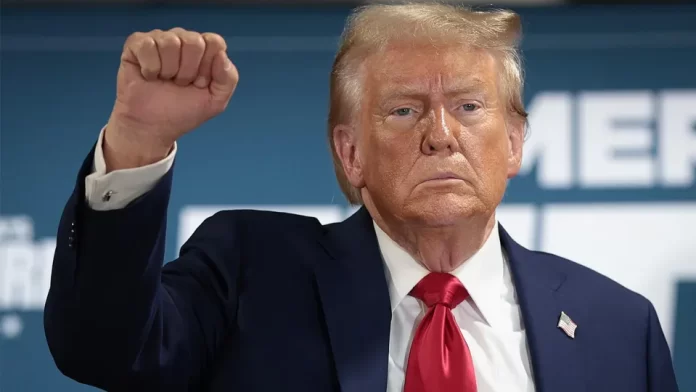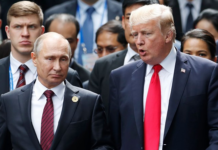Auto industry rocked by Trump’s 25% tariffs on US imports
Automaker stocks around the world slumped on Thursday after U.S. President Donald Trump said that he would impose 25% tariffs on all vehicles and foreign-made auto parts imported into the United States.
Volkswagen, BMW, Mercedes-Benz, Porsche and Continental lost 4.5 billion euros ($4.84 billion) in combined market value on Thursday, as investors panicked at the prospect of more costs and complexity in an industry already struggling with a slow ramp-up of electrification and high logistics costs.
Carmakers must now decide whether to localise more production in the U.S. to avoid the tariffs, swallow the cost, or pass it onto consumers.
Companies including Volvo Cars, Volkswagen’s Audi, Mercedes-Benz and Hyundai have already said they will move some production to the region this year.
But some CEOs have, in private, expressed reluctance to make long-term business decisions based on what could be a short-term policy.
“These policies have already made equity and debt markets extremely nervous, and we know that the president regards the Dow Jones index as a key barometer of his success,” analysts at Bernstein Research said in a note.
“It is hard to judge the duration of such chainsaw-like policies if these cause a market slump that does not appear to be transitory,” they added.
Shares in Stellantis and Porsche sank 4% on Thursday, while Mercedes-Benz was down 2.8%. . General Motors slumped 6.5% in premarket trading, while Ford was down 4.3%.
Porsche, which has no U.S. production base, saw a larger drop of 4.9%.
Disaster for the sector
The new levies could add thousands of dollars to the cost of an average U.S. vehicle, contradicting Trump’s promises to combat consumer product inflation.
Levies on car imports take effect on April 3, while those on auto parts begin from May 3, the White House said on Wednesday.
Nearly half of all cars sold in the U.S. last year were imported, research firm GlobalData says, with vehicles often crossing between Canada, Mexico and the United States multiple times in the production process.
On Wednesday, Trump reiterated that he expected the auto tariffs to prompt automakers to boost investment in the United States, instead of Canada or Mexico.
READ ALSO: As Tinubu dismantles democracy’s guardrails
Automakers in North America have largely enjoyed free trade status since 1994. Trump’s 2020 U.S.-Mexico-Canada Agreement (USMCA) imposed new rules to spur regional content production.
After clamping tariffs of 25% on Mexico and Canada in early March, Trump allowed a one-month reprieve for vehicles produced in compliance with the terms of his USMCA.
The new rules do not extend that reprieve.
Non-U.S. content to be taxed
Importers of automobiles under the USMCA will get the chance to certify their U.S. content so that only non-U.S. content is taxed, the White House said.
An exemption for imports from Canada and Mexico would provide relief for the Volkswagen brand as well as GM, Ford and Stellantis, whose supply chains are intertwined across the region.
Ultimately, the impact will be felt across the industry, said Moritz Kronenberger of Union Investment, which holds shares in Volvo, Volkswagen, Mercedes-Benz and Continental, describing the tariffs as “a disaster for the entire sector.”
Before the new tariffs were unveiled, automotive services provider Cox Automotive predicted they would add $3,000 to the cost of a U.S.-made vehicle and $6,000 to vehicles made in Canada or Mexico, without exemptions.
If tariffs go through, by mid-April, Cox expects disruption to “virtually all” North American vehicle output, leading to 20,000 fewer vehicles a day, or a hit of about 30% to production.
German minister, autos lobby call for urgent EU-US talks over tariffs
Meanwhile, Germany’s economy minister and its autos association slammed Donald Trump’s newly-announced 25% tariff on imported vehicles to the U.S. as bad for European and U.S. economies, calling for urgent negotiations to ward off a spiralling trade war.
Shares in Volkswagen, the most exposed among German carmakers to tariffs because of its large supply base in Mexico and lack of U.S. production for its Audi and Porsche brands, dropped 5.1% in pre-market trade.
Other autos stocks including Mercedes-Benz, BMW, and Daimler Truck dropped around 3.5%, with autos supplier Continental down 2.9%.
“The EU must now give a firm response to the tariffs – it must be clear that we will not back down in the face of the USA,” Economy Minister Robert Habeck said.
Germany’s VDA car lobby called the new levies a “fatal signal” for free, rules-based trade, warning they would harm companies as well as global supply chains.
“The German automotive industry is calling for immediate negotiations between the U.S. and the EU on a bilateral agreement,” VDA president Hildegard Mueller said in a statement.
Still, research by the IfW economic institute found that Germany would not be the hardest-hit economy by U.S. tariffs, the FAZ newspaper reported.
The institute estimates that German gross domestic product will be 0.18% weaker in the first year after the introduction of the tariffs in real terms, compared with a 1.81% hit in Mexico and a 0.6% blow in Canada.
“Overall, the export losses are limited, as cars are often produced close to the sales market,” IfW trade economist Julian Hinz said in comments carried by FAZ.
- REUTERS













